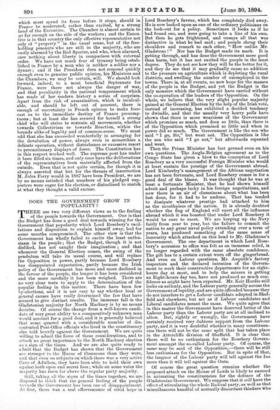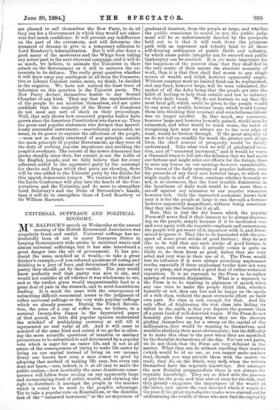DOES THE GOVERNMENT GROW IN POPULARITY ?
THERE are two very different views as to the feeling of the people towards the Government. One is that the Budget has done a good deal towards winning for the Government that popularity which Lord Rosebery's vacil- lations and disposition to explain himself away, had for some months compromised. The other view is that the Government has wholly failed to excite the least enthu- siasm in the people ; that the Budget, though it is not disliked, has not caught their imagination ; and that whenever the General Election comes, the swing of the pendulum will take its usual course, and will replace the Opposition in power, partly because Lord Rosebery has disappointed expectation, partly because the Irish policy of the Government has more and more declined in the favour of the people, the longer it has been considered and the more carefully it has been weighed. There are no very clear tests to apply to the determination of the popular feeling in this matter. There have been few by-elections, and it is not easy to say whether local or general causes have really determined the few that have seemed to give distinct results. The immense fall in the Gladstonian majority for North Hackney is by no means decisive. Of course the change from a well-known candi- date of very great ability to a comparatively unknown man would account for a good deal, and it is generally believed that some quarrel with a considerable number of dis- contented Post-Office officials who lived in the constituency also told heavily against the Government. We are quite willing to admit the force of these considerations, and to attach no great importance to the North Hackney election as a sign of the times. And we are also quite ready to admit that the Budget has shown that the Government are stronger in the House of Commons than they were, and that even on subjects on which there was a very active Cave of Adullam, they have been able to hold their own against both open and secret foes ; while on some votes the majority has risen far above the regular party majority.
Still, taking all the signs of the times together, we are disposed to think that the general feeling of the people to wards the Government has been one of disappointment. At first, there was a real effervescence of vivid hope in Lord Rosebery's favour, which has completely died away. He is now looked upon as one of the ordinary politicians on the look-out for a policy. Sometimes it looks as if he had found one, and were going to take a line of his own. But then he gets frightened, and unsays all that was distinctive in what he had said ; and people shrug their shoulders and remark to each other, " How unlike Mr. Gladstone ! " Nor has the Budget made its mark. It is getting through, and has done the Government more good. than harm, but it has not excited the people in the least degree. They do not see how they will be the better for it, and they do see that it may gradually cause an addition to the pressure on agriculture which is depleting the rural districts, and swelling the number of unemployed in the towns. There is, at all events, no new hope for the masses of the people in the Budget, and yet the Budget is the only measure which the Government have carried without the co-operation of the leaders of the Opposition. On the whole, we believe that the very slight popular majority gained at the General Election by the help of the Irish vote, instead of increasing, has exhibited a decided tendency to dwindle, and that the usually very heavy polls have shown that there is more weariness of the Government which promises so much, and does so little, than there is of the Opposition which promised so little and when in power did so much. The Government is like the son who said " I go, Sir," but went not. The Opposition is like the son who said " I go not," but afterwards repented and went.
Then the Prime Minister has lost ground even on his own questions. The Anglo-Belgian agreement as to the Congo State has given a blow to the conception of Lord Rosebery as a very successful Foreign Minister who would at least sustain the prestige of the Government abroad. Lord Kimberley's management of the African negotiation has not been fortunate, and Lord Rosebery comes in for a good deal of the blame. It was thought that he was at least a fortunate Minister, that he had shown himself adroit and perhaps lucky in his foreign negotiations, and now there is an air of clumsiness about what has been last done, for it had to be undone. That has tended to dissipate whatever prestige had attached to him as the mouthpiece of the nation. It is already doubted whether the flag of England will exert all the influence abroad which it was boasted that under Lord Rosebery it would be sure to exert. We are keeping up the Navy fairly from year to year, but the failure to commit the nation to any great naval policy extending over a term of years, has produced something of the same sense of insecurity which attached on this head to Mr. Gladstone's Government. The one department in which Lord Rose- bery's accession to office was felt as an immense relief, is no longer regarded with the same absolute confidence. The gilt has to a certain extent worn off the gingerbread. And even on Labour questions, Mr. Asquith's factory inspectors and the declared intention of the Govern- ment to work their constructive departments for an eight- hours day at most, and to help the miners in getting an Eight-hours day too, have not produced as much con- fidence as might have been expected. Mr. Keir Hardie still looks on sullenly, and the Labour party generally accuse the Government of tepidity, and are quite offended because they do not interfere to get a Labour candidate adopted in Shef- field and elsewhere, but act as if Labour candidates and Liberal candidates meant the same. We quite agree that in this matter the Government have deserved better of the Labour party than the Labour party are at all inclined to allow. But, rightly or wrongly, the Government have certainly received very dubious support from the Labour party, and it is very doubtful whether in many constituen- cies there will not be the same split that has taken place in the Attercliffe division of Sheffield. It is clear that there will be no enthusiasm for the Rosebery Govern- ment amongst the so-called Labour party. Of course, the same may be said of the Opposition,—there will be still less enthusiasm for the Opposition. But in spite of that, the languor of the Labour party will tell against the Ins more than it will tell against the Outs.
Of course the great question remains whether the proposed attack on the House of Lords is likely to succeed in animating the constituencies for the defence of the Gladstonian Government. We suppose that it will have the effect of stimulating the whole Radical party, as well as that miscellaneous handful of mutually discordant thinkers who are pleased to call themselves the New Party, to do all they can for a Government in which they would not other- wise feel much confidence. It will prevent any indifference on the part of the extremists, and will determine the dreamers of dreams to give in a temporary adhesion to Lord Rosebery's Administration. But it will also deter a good. many of the moderates and the Whigs from taking any active part in the next electoral campaign, and it will do as much, we believe, to animate the Unionists in their attack ou the Government as it will to animate the ex- tremists in its defence. The really great question whether it will draw away any contingent at all from the Conserva- tive or Liberal Unionist ranks, must, we think, be decided in the negative. We have not noticed the least trace of indecision on this question in the Unionist party. The New Party declare themselves hostile to any Second Chamber of any kind. They say that the representatives of the people do not mistrust themselves, and are quite confident that the majority of the House of Commons do not need any sort of check on their proceedings. Well, that only shows how conceited popular bodies have grown since the American Constitution was drawn up. Then the great and popular statesmen who devised that marvel- lously successful instrument,—marvellously successful, we mean, in its power to capture the affections of the people, —were not so deeply convinced of any principle outside the main principle of popular Government, as they were of the duty of curbing popular impatience and avoiding the people's overhaste. The conceit of the newer democracy has grown steadily since then, but conceit is not the foible of the English people, and we fully believe that for every adherent added to the aggressive party by the contempt for checks and drags which that party are showing, there will be two added to the Unionist party by the dislike for this uppish democratic temper. We venture to think that the Leeds Conference will play into the hands of the Con- servatives and the Unionists, and do more to strengthen Lord Salisbury's and the Duke of Devonshire's hands, than it will do to strengthen those of Lord Rosebery or Sir William Harcourt.



















































 Previous page
Previous page